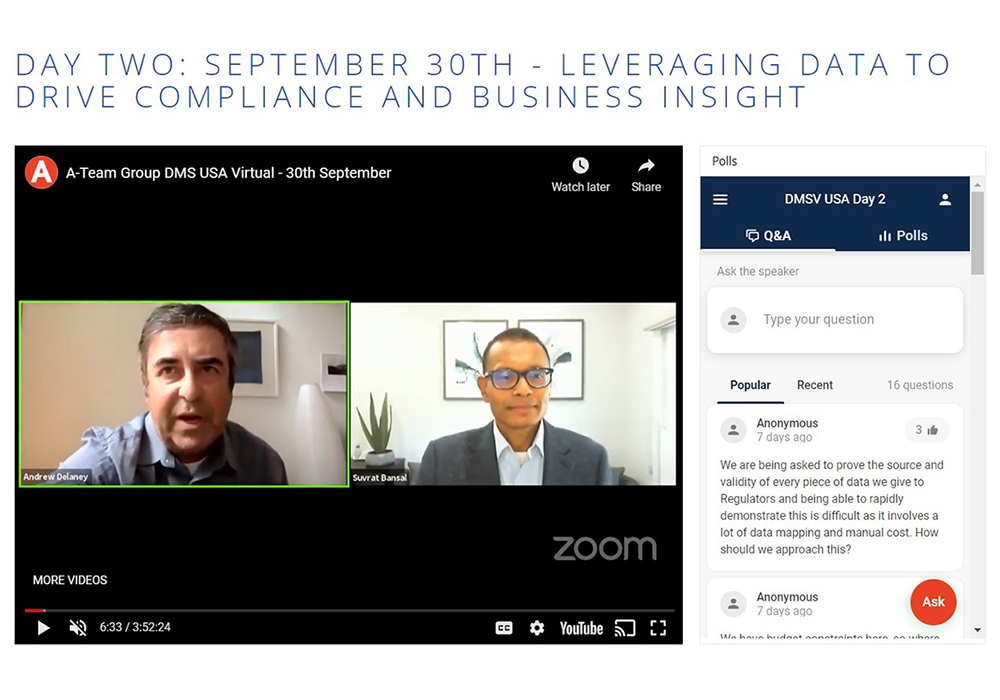
Financial institutions will need to create highly trained teams dedicated to properly interpreting the growing volumes of ESG data they’re receiving, a leading data executive has forecast.
But the novel nature of the information will mean data professionals must give up some of their autonomy to researchers who are better equipped to incorporate it into their models, Suvrat Bansal, Founder of Stellar Data Labs, said.
The former CDO at UBS Asset Management told A-Team’s Data Management Summit USA Virtual last week that ESG experts will soon be as crucial to asset and portfolio managers as risk analysts and other market researchers.
“The only way to translate that (data) is to have a dedicated research team that sits in the middle of the providers and the portfolio and the research teams – the people who are putting it to use,” Bansal said in a keynote fireside conversation with A-Team President and Chief Content Officer Andrew Delaney.
“Most of the good organisations who are thinking about ESG really seriously have formed a research body… that works very closely with the central research teams.”
New Recruits
Few firms have teams focused solely on ESG, with analytical processes largely managed by their broader research departments. But demand for ESG-focused expertise is expected to mushroom as investors increase pressure on financial institutions to provide insights into investible companies’ climate and governance risks.
Professional services giant PwC said earlier this year that it plans to hire 100,000 ESG professionals over five years. Its rival KPMG has said it will spend US$1.5 billion over the next three years to ramp up its ESG offering to clients, including the appointment of dedicated analysts.
Data management firms are also hiring. Alveo has taken on more talent with broader meta-service skills to help cope with a rapid increase in ESG-related business. GoldenSource Vice President of Product Management and Regulatory Affairs Volker Lainer said his company had been strengthening its teams in preparation for a flurry of activity as regulators begin to put reporting rules in place.
Internal Appointments
Bansal said he expects ESG expertise to be hard baked into companies’ research teams very soon. However, he cautioned that financial institutions were more likely to train their own in-house staff to lead the development of these expertise pools. He argues that vendors of ESG data may not have all the specific analytical skills asset managers will require.
“There is a lot of flexibility that data professionals need to start giving to their research teams,” he said, adding that in-house hiring also gives greater confidence to clients. “Internal researchers already know the impact of portfolio investing.”
Some companies had reached out externally by establishing partnerships with research institutes such as Massachusetts Institute of Technology, he added.
Nevertheless, Bansal said data professionals had a key role to play in helping firms establish their analytical teams and finding solutions to the problems caused by a lack of standardisation in ESG data. They are already playing an “enablement role” in managing the huge volumes of data companies are receiving, he said.
‘Enablement Role’
Data professionals’ input will also be vital in helping firms to digest new data sources within legacy infrastructure. They are also adept at bringing the growing volumes of climate and other new information streams in line with reference and market data.
“The data professional ends up playing a very strong enablement role because every step of the way (ESG data sources) cannot be handled with spreadsheets,” Bansal said. He illustrated the point with reference to his own experience of portfolio teams trying to force such data in “massive spreadsheets” that took four hours to calculate before eventually crashing.
“The volumes we’re talking about, the coverage we’re talking about, require a lot more sophisticated techniques to process and to align it with your other data.”
As regulators begin getting to grip with ESG reporting rules, Bansal said it would be sensible for firms to begin girding their compliance teams. While few hard regulations exist, he said that enough jurisdictions were formulating legal frameworks to make it worth their while to begin building their capabilities.
“Whether the regulation becomes an official regulation or not, what it is tasked to do is inform the investors on what to ask,” Bansal explained. “It’s quite prudent to remain very attuned to these regulations because they translate into investor questions on how (asset and portfolio managers) are doing, how they’re investing.”
Subscribe to our newsletter



